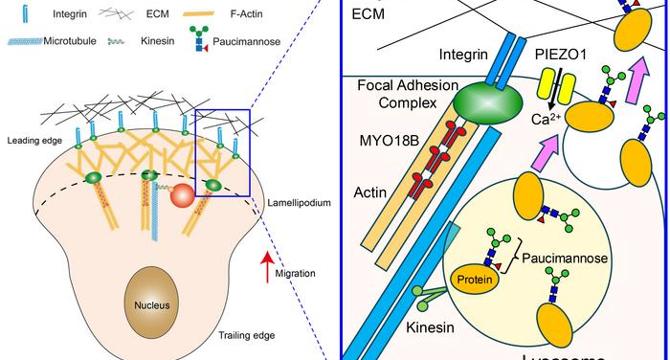Bioengineer
1w
245

Image Credit: Bioengineer
Exploring the Connection Between Lysosomal Function and Focal Adhesions: Implications for Cancer Research
- A recent study has shown the potential role of upregulated paucimannose glycans in various cancer cell lines as biomarkers or therapeutic targets.
- Lysosomal exocytosis is a cellular process that has implications in cancer biology and is important to investigate in relation to adhesion and migration.
- The study explores how focal adhesions, structures that anchor cells to the extracellular matrix, interplay with lysosomal exocytosis.
- The relationship between lysosomal exocytosis and focal adhesions suggests that lysosomes may have roles beyond waste management in cancer progression.
- A specific gene, MYO18B, has been identified as a pivotal regulator of lysosomal exocytosis, particularly influencing the maturation of focal adhesions.
- The study articulates a critical hypothesis that the increased levels of paucimannose glycans could be a direct consequence of dysregulated lysosomal exocytosis in cancer cells.
- Understanding these changes at the molecular level is essential for devising novel therapeutic approaches, highlighting a burgeoning field within glycobiology that warrants exhaustive exploration.
- Emerging techniques in live cell imaging allow for real-time observation of cellular behaviors that were previously difficult to elucidate.
- Collaborative efforts between institutions dedicated to glycoprotein research and cancer therapeutics are presented with a unique opportunity to connect the dots between basic science and clinical applications.
- The engagement of multidisciplinary teams will be paramount in transmuting basic research into viable cancer treatments.
Read Full Article
14 Likes
For uninterrupted reading, download the app